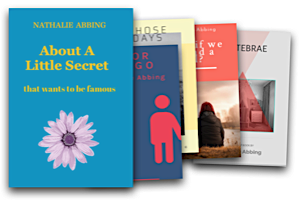
Vertebrae
Self-help book by Nathalie Abbing
- Motivation
MOTIVATION I know I can be quite opinionated and determined in giving my opinion on subjects close to my heart. Sometimes I overdo it a bit, I know that too, still working on that. I like to ask myself questions and make it a quest to find answers. When I worked as a make-up artist for the Dutch broadcast company, I was often found on the 4th floor where the news editors have their desks. I picked their brains as much as I could. So much intelligence in one space; a paradise for my mind. After the incident with Tiago, (read the true short story Poor Tiago) I started thinking about my action and why I reacted so intensely; I was literally shaking when I got home. I was happy with what I’d said, even though I wasn’t sure if I made the situation better or worse. I did not walk away thinking it was not up to me to say something. No, I had to do something, at least try. It made me think about what is important to me and what do I want for others. What subjects do I strongly defend. What is the role of knowledge and self-esteem. My thoughts came to the surface in the form of a classical self-help book. With a diagnosis, a six steps to follow cure and ready to go subjects. Too simple to take serious but also funny enough to go ahead in pretending to take it serious. This self-help book is therefore more about the concept of self-help books in general and a comment to ignorance taken with a pinch of salt.
VERTEBRAE self-help book
INDICATION
Now that you've made the choice to open a self-help book, there's a good chance you're receptive to influences from others. Don’t worry. This self-help book offers guidance to people who have little self-confidence and go through life insecurely. Have a look at the following statements:
- You are someone who thinks one thing, says another, and does the third.-You are inconsistent and usually act impulsively.
- You avoid discussions and often say; “I don't know.”-You notice that your opinion is rarely asked for.
- You do find values and standards important.
- A lot is filled in for you by others.-Your character description does not go beyond general and weak traits such as; sweet, loyal and caring.
Do you recognize yourself? If one or more of these statements apply to you, then there is a chance that your character lacks a strong backbone. To find the course of this absence, answer the following questions:
- Do you trust people who seem to know what they are talking about?
- Are you easy to believe something when it’s printed?
- Do you look up to people whose words can touch others and bring about change?
- Do you admire people for what they stand for and the choices they make in live?
If you are you inclined to say yes to one or more of these questions, you test positive for naivety and imbedded ignorance.
DIAGNOSIS
Your lack of character probably has to do with the fact that you haven't spent any time or at least not enough time on thinking and researching topics that are important to you. Your brain doesn't do what it’s made for and you are mistreating yourself. Right now, you are oblivious to what you really stand for. What is your opinion and what does your priority list actually look like? It's more than likely you don’t know.
The danger of living ignorantly is that you are susceptible to influences from people who pretend to know everything. This can have bad consequences. Curing your incapability to think for yourself has therefore the highest level of emergency.
CURE
You need some strong opinions. This self-help book provides you with the right vertebrae to repair the absence of your backbone. The topics listed in this book often create disputes and misunderstandings in the media, at work, birthdays, and other times when people interact.
By examining the topics through the 6 steps indicated, valuable knowledge can be collected to convert a topic into an opinion. What topics are appropriate to you. What does ring a bell and what not. You may want to add more trivial topics, understandable although now is probably not the right time to make this decision. I therefore recommend that you first study some topics from this self-help-book.
Try to arrange the topics in order of importance. Place the most interesting topic at the top. Begin developing your opinion by studying the topic at the top of your list. The information you gather on the topic may hit a nerve and upset you and make you want to stop the process before you have completed your research. This is a common side effect. The emotional weight you experience is a recognizable part of an opinion that can be placed high on the priority list. In this case it is wise to press yourself to continue your research on the topic in question. The more substantiated the opinion is, the more comfortable its emotional baggage feels.
It may happen that during your research you lose the urgency of the topic because another topic pushes itself. Check with yourself first if this is a recurring pattern for you. Do you often not finish things you start and do you fill your house with unopened courses and chores that never get done. Then it's time to break this pattern. It’s therefore highly recommended and strongly advised to continue your research on this topic. When giving up does not fit your pattern, feel free to change the topic. You might have found your first candidate to become a priority opinion. You will experience a personal growth with every opinion you make your own.
SUBJECTS IN ALPHABETIC ORDER
Abortion
Capitalism
Climate change
Death penalty
Discrimination
Emancipation
Euthanasia
Freedom of speech
Hierarchy
LGBTQ+
Meat industry
Monarchy
Nuclear energy
Obligatory education
Obligatory military service
Refugees
Religion
Voting rights
Step 1.
Think about it carefullyWhat do you know about this topic yourself? Crack your brain. Think about what you know, or think you know and have learned from the following sources:-from upbringing and family -from school, education, study -from friends and acquaintances -from the media and from any other source you can think of.
Also consider how you have acted on this topic in your own life. Have an objective look at your own inconsistency, inability and capability concerning the topic. Be honest. Looking at yourself like this can be quite confronting. Embrace the emotion and reassure yourself that you are working towards a positive change.
Step 2.
View it from all sides Look at the topic from all angle. Research the history, current events and future prospects from multiple sources to form a complete picture of the subject. Use the internet and library and try to find experts in this field. Make sure you provide diversity in the sources and types of media you consult.
To fill the gaps in your knowledge you better try to learn as much as you can from every piece of information you discover. If necessary, take notes. Only a topic that is thoroughly researched and is well substantiated is useful and can deliver enough information to form an opinion worth mentioning.
Step 3.
Create your own opinion Now start to think for yourself. Think long and hard about everything you have learned on this topic. Combine elements of multiple viewpoints and information sources to make up your own opinion. An opinion is rarely a clear yes or no, never a simple for or against, but is made up of various elements from a diversity of insights.
When it all gets too complicated for you to remember, you can train your brain by writing things down and quiz yourself. The more an opinion fits you, the easier it will be to remember. Never copy an opinion from one single source. This can have an adverse effect on your already deficient personality and should be avoided at all times.
Step 4.
Formulate your own opinionFind the right vocabulary to express your opinion. Keep your words and formulation clear and practical. Don't drown in reproducing an excess of technical terms, statistical figures and too much trivial details. Be prepared for all kinds of questions about your opinion. This can also be very personal.
Step 5.
Live what you stand forTry to live up to your opinion for yourself. Adjust to new habits. Only when you implement your opinion in your own life, you can experience the possible positive consequences of your opinion. When your opinion has become a natural part of your life, the substantiation is complete enough to convey this. If it is not, or not yet possible to implement your opinion in your life, be consciously aware of this and be prepared to motivate your choice when questioned.
Continue to view your new situation objectively and keep on adapting your opinion and its place on your priority list to recent events and advancing insight.
Step 6. And convey this
Try out your newfound opinion on people around you first to see if you've gone lunatic or not. If so, consult a certified psychiatrist immediately. If not, continue. Try not to get overexcited and don't offend anyone. Be patient and welcome questions as it indicates an interest in your point of view. Find the right tone and don't forget who you are talking to.Make sure that the person to whom you express your opinion has the space to reach to their own conclusions. Alternate facts with questions and personal notes. Know when to stop and possibly come back to it at another time.And never celebrate a victory of your opinion with "I told you so." You won’t make any friends with that attitude.
You now know your priorities, you have the knowledge to motivate your opinion and how to implement this in your own life. Your character has gained confidence and you can now face others with your feet firmly on the ground and your head held high. Good luck!
- Related stories
1 day ago | Stories & Poems
1 day ago | Stories & Poems
1 day ago | Stories & Poems
3 days ago | Stories & Poems
Interesting reads
1 day ago | Projects/Installations
Copyright © 2022 Nathalie Abbing

Thanks for reading!
Get in touch
Nathalie Abbing
Join the mailing list
By entering your email, you agree to receive marketing emails from nathalieabbing.com

Thanks for reading!
Get in touch
Nathalie Abbing
Join the mailing list
By entering your email, you agree to receive marketing emails from nathalieabbing.com








